International Journal of Industrial Ergonomics
Applied Ergonomics
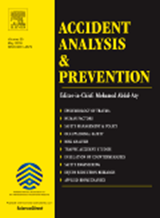
Accident Analysis & Prevention
Editor-in-Chief: Mohamed Abdel-Aty, University of Central Florida, USA
Publisher: ElsevierAccident Analysis & Prevention provides wide coverage of the general areas relating to accidental injury and damage, including the pre-injury and immediate post-injury phases. Published papers deal with medical, legal, economic, educational, behavioral, theoretical or empirical aspects of transportation accidents, as well as with accidents at other sites. Selected topics within the scope of the journal may include: studies of human, environmental and vehicular factors influencing the occurrence, type and severity of accidents and injury; the design, implementation and evaluation of countermeasures; bio-mechanics of impact and human tolerance limits to injury; modelling and statistical analysis of accident data; policy, planning and decision-making in safety.
IEA member prices for 2016:
USD 366 for all countries except Europe, Japan and Iran JPY 44,528 for Japan EUR 281 for European countries and Iran
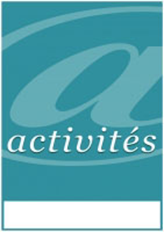
@ctivites
Editorial Manager: Yvon Haradji
Publisher : ARPACT
The aim of @ctivites is to publish high quality contribution focused on the understanding of human conducts (e.g. activity as addressed in cultural and historical activity theory and in French ergonomics, situated action, practice-based approaches…) and its relation to analysis, intervention and design of work situations and devices. In ergonomics and work psychology, the notion of activity has been developed for about 50 years, notably in Europe. It has led to the development of a number of researches and has contributed to frame the participation of ergonomists to design processes and to field interventions. Simultaneously, activity theories have expanded in different directions within different communities all over the world (within the Russian psychology community, in Nordic countries, in North and South America), while situated approaches of action and cognition, workplace studies and practice-based approaches have been increasingly discussed.
The diversity of these theoretical and methodological frameworks to analyze human conducts, their particularities, and their relations to intervention and design requires interdisciplinary debates and exchange of ideas. @ctivites is a bi-annual, open access and free journal. The main language is French. As such, all on-line texts are in French. However, the simultaneous publication of the texts in French and English is encouraged. The journal is abstracted in PsycINFO, and listed in the Pascal and Francis databases (CNRS, France).
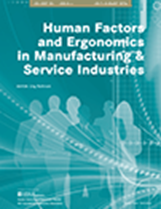
Human Factors and Ergonomics in Manufacturing & Service Industries
Editor: Ling Rothrock
Publisher: John Wiley & Sons, Inc.
The purpose of Human Factors and Ergonomics in Manufacturing is to facilitate discovery, integration, and application of scientific knowledge about human aspects of manufacturing, and to provide a forum for worldwide dissemination of such knowledge for its application and benefit to manufacturing industries. The journal covers a broad spectrum of ergonomics and human factors issues with a focus on the design, operation and management of contemporary manufacturing systems, both in the shop floor and office environments, in the quest for manufacturing agility, i.e. enhancement and integration of human skills with hardware performance for improved market competitiveness, management of change, product and process quality, and human-system reliability.
The inter- and cross-disciplinary nature of the journal allows for a wide scope of issues relevant to manufacturing system design and engineering, human resource management, social, organizational, safety, and health issues. Examples of specific subject areas of interest include: implementation of advanced manufacturing technology, human aspects of computer-aided design and engineering, work design, compensation and appraisal, selection training and education, labor-management relations, agile manufacturing and virtual companies, human factors in total quality management, prevention of work-related musculoskeletal disorders, ergonomics of workplace, equipment and tool design, ergonomics programs, guides and standards for industry, automation safety and robot systems, human skills development and knowledge enhancing technologies, reliability, and safety and worker health issues.
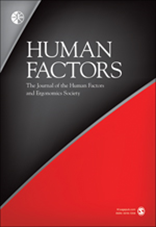
Human Factors
Editor: Patricia Delucia
Publisher: Human Factors and Ergonomics Society
Human Factors: The Journal of the Human Factors and Ergonomics Society publishes peer-reviewed scientific studies in human factors/ergonomics that present theoretical and practical advances concerning the relationship between people and technologies, tools, environments, and systems. Papers published in Human Factors leverage fundamental knowledge of human capabilities and limitations – and the basic understanding of cognitive, physical, behavioral, physiological, social, developmental, affective, and motivational aspects of human performance – to yield design principles; enhance training, selection, and communication; and ultimately improve human-system interfaces and sociotechnical systems that lead to safer and more effective outcomes.
Individual members of IEA federated societies receive a 15% discount off the individual subscription rate. Please contact HFES to obtain the IEA discount code (membership@hfes.org, 202/367-1114).
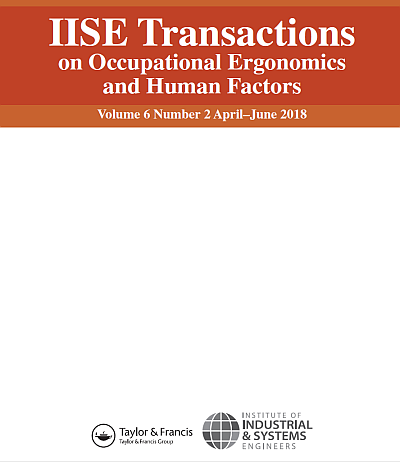
IISE Transactions on Occupational Ergonomics and Human Factors
Editor-in-Chief: Maury A. Nussbaum, Virginia Tech
Publisher: Taylor & Francis
The IISE Transactions on Occupational Ergonomics & Human Factors (IISE TOEHF) aims to improve human-system performance and enhance human health and safety. The journal has a primary and fundamental emphasis on people at work. We are committed to enhancing communication and information transfer between researchers and practitioners in the occupational ergonomics and human factors discipline. Multidisciplinary investigations are particularly encouraged, and the journal welcomes a variety of submissions, including those that are analytical, experimental, applications, or viewpoints. Submissions from practitioners are also strongly encouraged (e.g., case reports, emerging issues, applications, and letters to the editor).
- We seek to compile and disseminate knowledge on:
Occupational ergonomics and human factors theory, technology, application, and practice. - Technology to improve human-system performance and enhance human health and safety
- Physical, cognitive, and organizational ergonomics and human factors
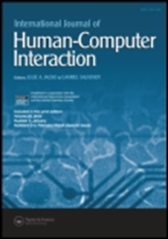
International Journal of Human-Computer Interaction
Editor: Constantine Stephanidis <cs@ics.forth.gr>
Gavriel Salvendy, <salvendy@purdue.edu>
Publisher : Taylor & Francis.
International Journal of Human-Computer Interaction addresses the cognitive, social, health, and ergonomic aspects of work with computers. It also emphasizes both the human and computer science aspects of the effective design and use of computer interactive systems. The journal presents original research both in the generic aspects of interface design and in the special application of interface design in a variety of diversified leisure and work activities.
Professionals with an interest in the scientific implications and practical relevance of how computer systems should be designed and/or how they are actually used.
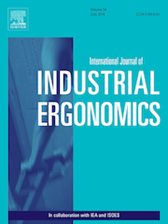
International Journal of Industrial Ergonomics
Editor in Chief: Anand Gramopadhye
Publisher: Elsevier
International Journal of Industrial Ergonomics publishes original contributions that add to our understanding of the role of humans in today’s systems and the interactions thereof with various system components. The journal typically covers the following areas: industrial and occupational ergonomics, design of systems, tools and equipment, human performance measurement and modeling, human productivity, humans in technologically complex systems, and safety. The focus of the articles includes basic theoretical advances, applications, case studies, new methodologies and procedures; and empirical studies. 2016 Subscription price for IEA and affiliated societies members
EUR 244 for European countries
GBP 207 USD 271 for all countries except Europe and Japan
JPY 31,173 for Japan
Please check with Emeasocieties@elsevier.com for price changes
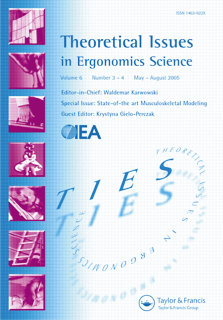
Theoretical Issues in Ergonomics Science (TIES)
Co-Editors in Chief: Waldemar Karwowski and Dylan Schmorrow
Publisher: Taylor and Francis
Theoretical Issues in Ergonomics Science (TIES) aims to advance the science and philosophy of human factors and ergonomics (HFE). The Journal promotes a broad array of theoretical issues, methodology, and philosophical dialogues about human interactions within simple and complex systems, and is a highly respected forum for interdisciplinary discussion within this field, cutting across the human-centered design, practice, engineering, technology, and management of human-compatible systems in the broadest sense. This includes data-driven applied and experimental work as well as work derived from the practice of HFE with the caveat that the work has implications to, or addresses in some manner, theoretical issues in ergonomics science.
The Journal seeks to explore the frontiers of ever expanding HFE discipline by focusing on HFE contributions to contemporary society in the context of human interactions with technology, engineering, economics and business, as well as consideration of safety and security, human ecology, sustainability, service systems, urbanization, communication, education, and social and government policies. TIES also promotes a large scale system-of-system perspective of HFE, and discusses its implications for the development of the human-centered global society.
The Journal is proactive in its mission to develop a unique HFE discipline, and seeks to define and promote theories of HFE as distinct and inherently valuable for the global knowledge community, including human factors scientists and safety engineers, ergonomists, industrial designers, industrial engineers, systems engineers, design engineers, cognitive and organizational psychologists, health care professionals, business analysts, and human-computer interaction and user experience specialists and practioners.
Theoretical Issues in Ergonomics Science emphasizes new knowledge, publishing original, high-quality, peer-reviewed papers as well as commissioned reviews and peer-reviewed commentaries. Topics include both qualitative and quantitative methodological frameworks and HFE theories. The Journal presents papers that discuss principles of the investigative process in research, social and historical issues, and science of science perspectives on HFE. Papers that examine the discipline itself, including bibliographical analyses of classic papers, are also published.
Unlike other HFE journals that deal primarily with applications, Theoretical Issues in Ergonomics Science focuses on theoretical aspects of the HFE discipline, such as causality and behaviour in a complex human-technology-environment systems. Above all, the Journal provides a vehicle for the dissemination of research on the underpinning scientific foundation of the discipline of HFE that no other publication covers. It creates the opportunity to consider the newest approaches of associated domains and to implant them in human-centered and human-compatible system design. Authors are encouraged to discuss extensive and coherent theories that stimulate future empirical and modelling research within the HFE discipline.
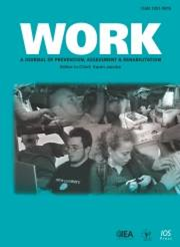
WORK: A Journal of Prevention, Assessment & Rehabilitation
Publisher: IOS Press, The Netherlands (https://www.iospress.com/work)
Founding Editor-in-Chief: Karen Jacobs, OT, EdD, OTR, CPE, FAOTA (kjacobs@bu.edu)
WORK is an interdisciplinary, international journal which publishes high quality peer-reviewed manuscripts covering the entire scope of the occupation of work. The journal’s subtitle has been deliberately laid out: The first goal is the prevention of illness, injury, and disability. When this goal is not achievable, the attention focuses on assessment to design person-centered intervention, rehabilitation, treatment, or controls that use scientific evidence to support best practice. WORK occasionally publishes thematic special issues and sections, but in general, issues cover a wide range of topics such as decent work and economic growth, gender equality, occupational safety, and health, good health and wellbeing, working from home, ergonomic considerations with children, youth and students, the aging workforce, workplace violence, injury management, performing artists, ergonomic product evaluations, and the awareness of the political, cultural, and environmental determinants of health related to work.
Dr. Karen Jacobs, the founding editor, and her editorial board especially encourage the publication of research studies, systematic reviews, clinical practice, case study reports, and Sounding Board commentaries. With an internationally renowned interdisciplinary editorial board, WORK maintains high standards in the double-blind peer review evaluation and publication of manuscripts. All manuscripts are reviewed expeditiously and published in a timely manner. WORK prides itself on being an author-friendly journal.